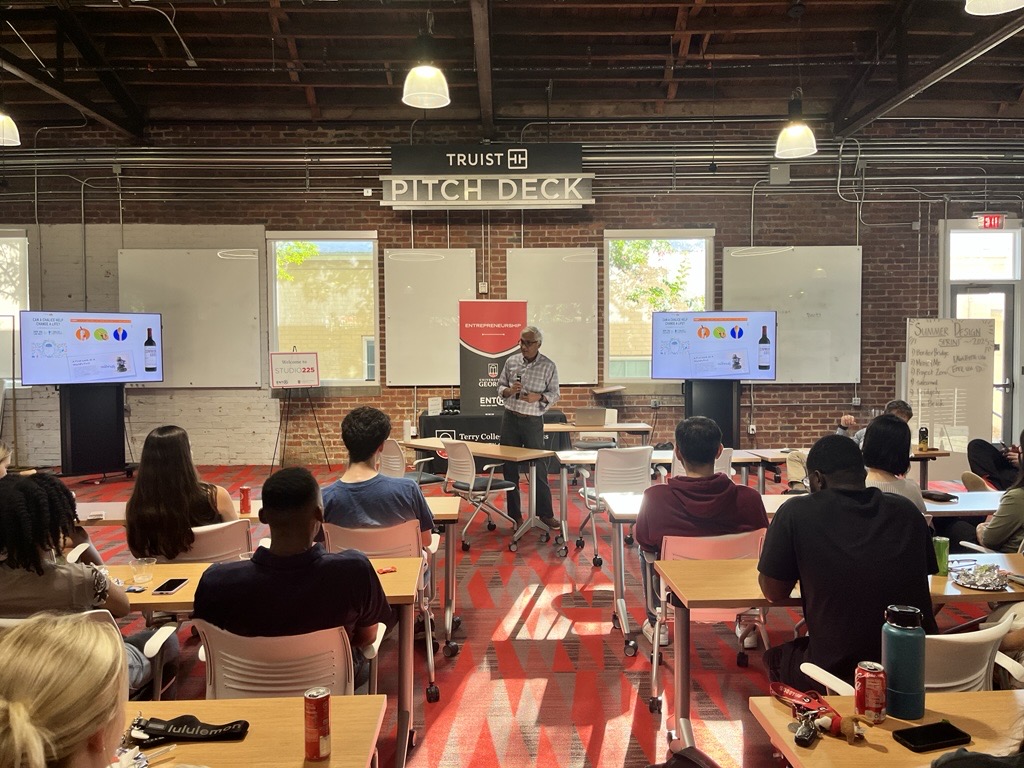They say sustainability has a business problem, and business — well — has a sustainability problem.
Sundar Bharadwaj, the Coca-Cola Chair of Marketing at the University of Georgia Terry College of Business, has spent the last decade trying to convince students and executives that business and sustainability don’t have to be at odds with each other.
“For too long, the idea of ‘doing good’ has been seen as a cost center, something relegated to a company’s philanthropy budget,” Bharadwaj told a group of UGA students gathered for a sustainable business talk on Sept. 2. “But what we are seeing today is that consumers, employees, and investors are increasingly rewarding brands that stand for something more than just their products. This isn’t about charity; it’s about competitive advantage.”
Bharadwaj’s talk was organized by the Terry College sustainable business faculty to celebrate the publication of his recent book, Good Growth: How brands win with social impact.
Bharadwaj’s research on marketing investments explores their impact on firm risks, returns, sustainability, societal outcomes, and the integration of AI in marketing across U.S. and global markets.
In Good Growth, he provides a framework for how companies can identify their unique social purpose, embed it into their operations, and communicate their story effectively to the market. It offers a blueprint for leaders seeking to navigate the complex demands of today’s conscious consumer.
Drawing on extensive research, Bharadwaj shared examples of companies that successfully leveraged social and environmental responsibility to build strong brands and create long-term value. He emphasized companies could build a marketing plan around their commitments to sustainability or social good, but these campaigns don’t work if there’s not a real commitment.
“Consumers can see through greenwashing,” he explained. “The companies that are truly winning are those that have aligned their values with their business practices in a fundamental way. They are transparent about their supply chains, they are investing in renewable energy, and they are creating products that are designed to minimize waste.”
Companies that succeed can find a “sweet spot” where societal benefits converge with revenue benefits.
Bharadwaj pointed to the story of Tony’s Chocolonely, a chocolate brand launched to highlight the problem of child labor in the cocoa industry and show it was possible to minimize child labor in the supply chain. Since 2015, Tony’s Chocolonely is sold nationwide at major retailers, and its open supply chain, which has a 4% child labor prevalence compared to the industry average of 46%, is being used by other companies.
“The company is growing really fast and in significant ways,” Bharadwaj said.
Chocolonely doesn’t have side philanthropy trying to end child labor; that mission is core to its business model and marketing proposition — and it’s working, he said.
Bharadwaj cited research showing companies with a climate focus yielded a 30% to 40% higher return than companies that were not. He also noted that while conventional products are growing at 5%, sustainable products are growing at 12.4%.
“Consumers care. Consumers are buying these numbers. They’re willing to pay more for these products,” he said, emphasizing that good growth is a powerful differentiator leading to greater profits and market share.

